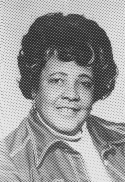Page 53
[Begin Tape 1, Side A]
Payne: Where do we start?
Currie: You had said, before we got on tape, that you were a shy person.
Payne: Oh, yes. I said I was a shy person, and basically, I guess, I am, because I am very sensitive about my relationship to other people. I'm very sensitive. I never really intend to hurt people, as I don't like to be hurt myself. But in the business of my trade, journalism, you can't always deal with—it interferes with the business that you're going about of getting a story, so you have to learn to put that aside sometimes. I guess I've always been described as a tough-minded person, and I am, but I have always approached my subject with the idea that I'm dealing with not the person's character or personality per se, but about what he or she is doing to make the story worthwhile. I mean, why is this particular individual the subject of an investigation for a story? So you try to make that individual as comfortable as possible, relax them as much as possible before you approach the question. I've learned not to apologize. I don't start out saying, "I hate to ask you this, but I just need to know." That's bad. You just go right straight to it, go right straight to the heart of the matter. Sometimes you upset people a little; you're bound to. But if the particular person that you're interviewing has some trust in you and knows you by reputation as a person that does his business well, as ethically as possible, then you have a much better chance of getting what you want in your interview with this person.
So getting back to the original question, I'm shy, but I'm also shy about hurting other people.
Currie: How did you cope with your shyness in order to do your job?
Payne: I learned when I came to Washington, in other words, in a very competitive field, and that if I was going to succeed at all, I would have to learn to be as aggressive and tough as the rest of the persons in the pack. Although I was more or less an outsider, yes, I was, and I also was in the position of being on a periphery. When I say periphery, I mean that weekly newspapers weren't regarded too seriously, whether they were white or black. They just weren't supposed to be in the same league as the major media. So the best you could do, most of them could do, was be there as a nuisance value. They were there, but it was sort of like the cat looking with disdain at the mouse, you know It would not be worthwhile doing anything with. So you had to overcome that. You had to let the people in the press know that you were there for the same reasons that they were there. You were there to do a job, and you were going to do a job, and you had to more or less fight your way in. I had to overcome practically three things: first, as a woman; second, as a Negro; and third is from what they called a minor press—not a minority press, a minor press. So I had those three things to overcome.

